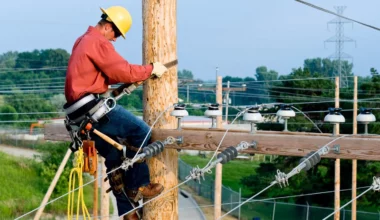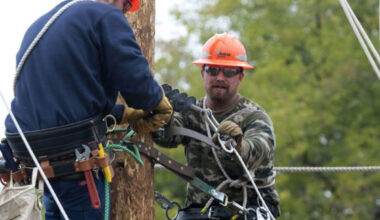Discover the top 10 best lineman schools in California for 2023. Explore tuition costs and admission requirements for the best lineman training programs in California. Choose the right school to kickstart your lineman career in California.
California is an excellent state in the US. It maintains its power grid and tries to provide electricity for its citizens as much as possible.
There are about 6,730 linemen in California, and the number is not going to reduce anytime soon; instead, it will increase because the lineman electrical utility industry is one of the fastest-growing industries in the US.
This article will give you all the points you need to know about a lineman’s career, especially in California. It will answer all your questions while bringing essential facts, such as tuition rates, requirements, etc., to your notice.
Read More:
- Best Lineman Schools in Tennessee: Tuition& Requirements
- Best Lineman Schools in Tennessee: Tuition& Requirements
- 10 Best Lineman Schools in Michigan: Tuition & Requirements
Table of Contents
Are there Lineman Schools in California?
The lineman school is likened to every known college or university that offers training for other professions or careers.
Several schools have made a mark in the lineman industry, and they are;
- California-Nevada Electrical Joint Apprenticeship Training and Trust Fund
- Northwest Lineman College
- California Electrical Training Inc
- Sacramento Area Electrical
- The Inland Empire Electrical Training Center.
How Long is Lineman School in California?
The required time to finish training ranges from 3 to 5 months, depending on the qualification, with an average time of 3. 8 months.
How Much Do Linemen Make in California?
The average lineman salary in California is $98,464, as was reported on June 28, 2022, but the range falls naturally between $92,432 and $103,170. Salary scopes also vary due to many factors such as educational certificates, additional skills, number of years put into the job, etc.
How Much Does Lineman School Cost in California?
Just as tuitions are attached to regular universities and colleges, so is the training rendered in the lineman institutions paid for, as this is one of the crucial requirements for access classes.
The cost to attend Northwest Lineman College ranges from $11,000 to $28,000, depending on the training and qualifications, with an average price of $11,000.
What are the Best Lineman Schools in California?
#1 Yavapai College Lineman program
Yavapai College is a public college in Yavapai County, Arizona. The main campus is in Prescott, with locations in Clarkdale, Prescott Valley, Chino Valley, and Sedona.
The certificate in Electric Utility Technology is designed to prepare the student for a position as a pre-apprentice-level line worker familiar with the use of tools, materials, and equipment in the electric utility industry.
In addition, the annual tuition rate is $2, 492
#2 Sacramento Power Academy
The Sacramento Power Academy is the premier utility training school in the western Academic States. The program provides a way for municipal power line technicians to increase their skills and knowledge. If properly administered, a technician’s work performance will become proficient regardless of his experience level. Each employee is required to be trained and professional at their assigned task.
This program has a strong track record of establishing solid professional connections with employers in the Northern California area.
In addition, it is essential to note that its admission requirement is a High School Diploma Certificate or a GED.
Lastly, the tuition for Sacramento Power Academy is $6,500
#3 Chandler-Gilbert Community College Lineman program
The Certificate of Completion (CCL) in the Electric Utility Technology program is designed to prepare the student for the position of an apprentice-level line worker who is familiar with the use of tools, materials, and equipment in the electric utility industry.
In addition, Students that finish this program will be trained in power line installation and maintenance, pole climbing and use of tools, truck and equipment operation and overhead and underground distribution, and construction and maintenance of electrical lines. This certificate is fully embedded in the Associate in Applied Science (AAS) in Electric Utility Technology.
Lastly, Chandler-Gilbert tuition costs $2,070 annually.
#4 East Los Angeles Skills Center, Lineman School
Student Learn about physical, mechanical, and industry-related tasks for power distribution careers. It includes safety requirements, safe climbing techniques, industry-related fitness, and electrical theory.
This program is often in high demand as it has a strong track record for job placement.
Also, this school’s requirements are a Class A driving license and a High School Diploma.
Furthermore, the annual tuition of this school is $ 8,528.
#5 Santiago Canyon College
This training program is meticulously planned to include classroom/field instruction and 7,000 hours of on-the-job training as an indentured apprentice, which takes approximately three and a half years to complete.
The classroom/ field instruction includes trade-related subjects: basic electricity, AC theory, transformers, circuitry, rigging, overhead and underground construction, equipment operation, Rubber Glove training, and Hot Stick training.
The annual tuition is approximately $31,000
#6 Los Angeles Trade Technical College.
Los Angeles Trade-Technical College offers various programs for individuals working in the utility industry.
It is recommended to begin with the fundamentals certificate of achievement, move to the more significant certifications, and then complete the degree programs.
The certificates are stackable, meaning the classes build as you reach each level, so you do not have to repeat the courses you have already received.
Also, Los Angeles’s annual tuition is $ 8,570
#7 The Electrical Training Alliance of Silicon Valley
Students in this institution’s electrical ALLIANCE training programs earn while learning through apprenticeships.
Not only does this allow students to earn money while still in school, but it also generates new tax revenue for the economy.
Participants in the electrical training ALLIANCE programs pay over $600 million in taxes each year.
This is truly a model program because it requires little to no money from taxpayers while training some of the most productive workers in the world, who then contribute millions of dollars to the country.
In addition, the electrical training alliance tuition ranges from $ 125 to $30,000, depending on the qualification, with a median cost of $2,000.
#8 Ventura County Electrical Apprenticeship
During an eight-month cycle, the Ventura County Electrical Apprenticeship Program accepts applications. Qualified Electricians will take an Algebra and Reading Comprehension Aptitude Test. They will invite those who pass the test to an oral interview with the Apprenticeship Committee.
Throughout their apprenticeship, each apprentice attends three years of related training on selected Saturdays and five-week-long (specialized) training classes.
In addition, The California-Nevada Power Lineman Apprenticeship Program is a four-year “earn while you learn” school consisting of a minimum of 7,000 hours of on-the-job training and related academic classes.
There are specific amounts of required training hours that an apprentice must complete out of these hours. While working in a particular type of training, an apprentice may remain in the program after the 7,000-hour mark.
Furthermore, the California-Nevada Power Lineman Apprenticeship Program has no out-of-pocket tuition costs. If you work for a contributing contractor for five years or 8,000 hours after completing step six of the seven-step program, all tuition fees (approximately $31,000) are waived. Otherwise, you will be obligated to pay the entire tuition amount. The amount owed will be prorated for every 2,000 hours worked.
Although your tuition is covered, there will be some additional expenses you will be responsible for. These include, but may not be limited to:
Apprentices must pay all lodging costs unless it is related to storm work.
Apprentices must provide their hand tools and climbing tools.
#9 Orange Electrical Apprenticeship and Journeyman Training
The Orange County Electrical Training Center has been serving the industry in Orange County for over 40 years.
The school provides a qualified and highly skilled electrical, transportation, and telecommunication workforce. The Training Center is a partnership between the Orange County Chapter of NECA and the International Brotherhood of Electrical Workers Local 441. The finest electrical workers in Orange County receive their training at the Training Center. It’s a model educational partnership that produces the best-trained, most up-to-date apprentices and journeymen in the country.
The annual tuition of orange electrical is $ 5,619
#10 California Electrical Training
CET’s state-approved Electrical Trainee Program lasts two years. Students are enrolled in school for ten three-month quarters.
This training will provide students with the materials they need to confidently understand concepts, real-life techniques, and code information to become highly qualified Electrical Trainees capable of working under any contractor. The State will issue you an Electrical Trainee (ET) card as soon as you enroll.
The program can begin at any time during the year. A quarter starts when the student makes the first quarter payment.
The ET program costs $500 per quarter, including online and on-site lab classes.
Are There Electrical Lineman Schools in California?
The Electrical Lineworker Program is designed to train persons that wish to become entry-level electrical line workers for private and public utility companies and related employers. Students will learn academic and field skills necessary for entry-level workers. Safety is stressed in every aspect of the job.
- Yavapai College Lineman Program
- Sacramento Power Academy,
- Chandler-Gilbert Community College Lineman program
- Los Angeles Skills Center Lineman School
Are There Lineman Apprenticeships in California?
A lineman apprentice is the first step to becoming a journeyman lineman and, ultimately, a master lineman.
A lineman apprentice’s responsibilities include assisting company linemen in constructing and maintaining electrical power systems.
Lineman apprentice tasks include taking measurements and assisting journeyman linemen with equipment and other charges.
Apprenticeships promote economic development because, as a lineman apprentice, you are paid while learning on the job.
There are, however, some institutions that are in charge of apprenticeship programs.
- The NVE Energy Lineman Apprenticeship Program.
- Northwest Lineman College, California
- Imperial Valley College Lineman Program
- Santiago Canyon College Lineworker Program
What are the Requirements to Become a Lineman in California?
- To become a lineman in California, there are some basic requirements necessary for you to fulfill. Without these requirements, you can not be a lineman.
- Must be 18 years of age.
- Must have acquired a High School Diploma, GED, Certificate of Proficiency, or equivalent.
- Must have completed one year ( two semesters) of high school algebra or one semester of college algebra with a passing grade.
- Must have a valid, unrestricted driver’s license
How to Become a Lineman in California.
To become a lineman in California, the first step is an apprenticeship. A lineman apprenticeship is an “earn while you learn” program in the sense that it is an entry-level role focused on education and training.
California apprenticeships in the line industry can be challenging to enter, and having a CDL and going to line school can improve your chances in the region. Some of the lineman schools are also known as pre-apprenticeship programs.
Apprentices in California work alongside veteran journeymen and learn from the best instructors in the industry. Apprentices are members of high-energy teams that work in the field to maintain substations, power lines, and other electrical projects.
Lineman apprentices in California will be responsible for performing diversified work related to the construction and maintenance of poles, power lines, auxiliary facilities, and equipment for electricity distribution. A lineman can help construct, maintain and inspect the transmission and distribution of electrical cables.
How Much Do Apprentice Linesmen Make?
Lineman apprentices in California typically make between $48,000 and $58,000 per year.
What are the Skills Required for a Lineman?
Linesmen must understand electrical and power equipment and know electrical currents, voltage, and resistance. They must also possess strong analytical and problem-solving skills, particularly when assessing power cables for repair or replacement or defective troubleshooting equipment.
What are the Best Paying Lineman Jobs in California?
Electrical Lineman Salary ranges from $65,000-$76,000 per year.
An electrical lineman, or electrical line worker, installs and maintains power lines. Their duties include installing or maintaining new power lines and repairing broken transformers. Linemen ensure electrical lines are functioning and make repairs quickly and accurately to restore electrical customer service. Line workers work at multiple outdoor sites and tall heights.
Lineman Salary ranges from Salary range: $33,500-$61,000 per year
A Lineman, also known as a line worker, is an electrician responsible for installing and repairing wire cables and electrical power wiring. As a Lineman, you climb telephone poles and work while hanging many feet above the ground. A Lineman also operates and repairs equipment to meet telephones, Internet, and other communication needs.
Wire-line Operator Salary ranges from $36,000-$51,000 per year.
A wire-line operator installs cabling that enables a company to lower equipment into a gas or oil well. As a wire-line operator, your duties include:
- Designing the project.
- Analyzing data on potential field sites.
- Drilling holes.
- Installing the mechanical equipment or cabling rig necessary to fulfill the plan.
- You may also perform equipment maintenance. A wire-line operator must understand the regulations and safety codes related to gas exploration and reclamation.
Wire-cutter Salary range: $27,000-$31,500 per year
A wire cutter is typically a warehouse job where you are in charge of cutting wires and cables with machines. Your job as the cutting machine operator is to ensure that the cuts are accurate. You measure and bundle wires and cables for job orders, then work with installation teams to ensure they have the proper lines for assembly. As a wire cutter, you may be responsible for unloading and loading materials, moving waste or materials to the appropriate locations, and ensuring that all equipment is operational.
Your duties as a wire cutter may include:
- Unloading and loading materials.
- Moving waste or materials to suitable locations.
- Verifying all the equipment works correctly.
Frequently Asked Questions
What should you know before going into lineman?
Linemen must be able to climb and climb all day long. A standard Electrical pole is 35 feet tall. Linemen must be able to climb that pole until the task at hand is done. Some electrical poles may reach up to 120ft from the ground.
How long is a lineman school in California?
The California-Nevada Power Lineman Apprenticeship Program is a four-year “earn while you learn” school consisting of a minimum of 7,000 hours of on-the-job training and related academic classes. Of these hours, there are specific amounts of required training hours that an apprentice must complete.
Is lineman training hard?
Becoming a Journeyman Lineman takes pride in craftsmanship, a good attitude, and a strong work ethic. It can be a grueling yet rewarding process. You will have to make tough decisions and sacrifices along the way.
Do linemen have a life?
Absolutely yes. The linemen must find a work-life balance and understand they will need to turn down pay opportunities over time. You will not be physically worked to death, but you will sometimes live at work.
Conclusion
A lineman’s career is lovely in an excellent state like California. The schools also found in California are all top-notch, where you can get wonderful training. It is now on you to choose the one most suitable for you, as all the information you need to know has been provided in this article.
Good luck!!


